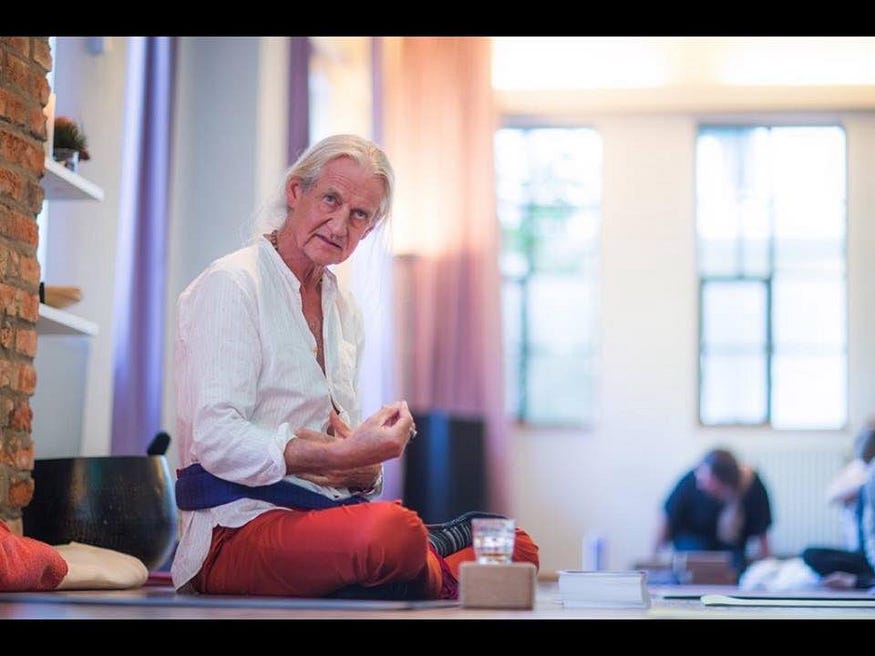Technical Terms: Guru Parampara | Mark Whitwell
The term parampara is a beautiful word that refers to the passing of wisdom-knowledge from one teacher to the next through history. The word implies a continuous, unbroken transmission of learning; an uninterrupted sequence or thread. The gifts of indigenous wisdom cultures move along these precious lines.
In Yoga, parampara refers to the long chain of guru-shisya relationships that have carried these physical wisdom practices from ancient past into modern times.
It is thanks not only to Tirumalai Krishnamacharya and his son Desikachar, but also to the entire history of teachers that went before them, that we are able to enjoy these practices today — to hold Yoga for all people and to pass it on to future generations.
Now, there is a tradition in India of passing teachings on through biological family lines and there is something beautiful to this; but by no means is the guru parampara confined to that.
I recall a class with Desikachar in Chennai in the 1990s where he said:
“Anyone who is a sincere student of my father and who does their best to pass Yoga on to others is in the guru parampara (lineage) of my father.”
Such a statement captures Desikachar’s free spirit and big heart.
In its right form, the parampara is about teachings being passed along through actual relationship: mutual affection and respect between actual people: be it teacher-student or student-student; intimate, actual relationship both in linear historic lines, but also spread out in present time among affinity groups of people with affection and goodwill for each other.
Its misuse is the idea that someone of special social status or authority — “the knower” — holds exclusive possession of the knowledge. Within the presumption that you are lacking in some essential understanding about life, the knowledge holder wields their possession as an instrument of social power and hierarchy.
As J. Krishnamurti and then U.G. Krishnamurti (no relation) pointed out, this is only a mechanism of power. It is the social dynamic of disempowerment and this dynamic prevents Yoga from taking place.
Spiritual transmission occurs only in sincere friendship. The teacher is an equal friend, nothing more and nothing less. Without this quality a teacher is an obstruction and the problem itself.
In the mode of Respect for each individual it is a true teacher’s responsibility to impeccably deconstruct the persuasive and pervasive social model of inequality. This is the spiritual process. It leaves each person in his or her Ground as Life, in free unobstructed relationship with everything.
ABOUT THE AUTHOR:
Mark Whitwell has been teaching yoga around the world for many decades, after first meeting his teachers Tirumali Krishnamacharya and his son TKV Desikachar in Chennai in 1973. Mark Whitwell is one of the few yoga teachers who has refused to commercialise the practice, never turning away anyone who cannot afford a training. The editor of and contributor to Desikachar’s classic book “The Heart of Yoga,” Mark Whitwell is the founder of the Heart of Yoga Foundation, which has sponsored yoga education for thousands of people who would otherwise not be able to access it. A hippy at heart, Mark Whitwell successfully uses a Robin Hood “pay what you can” model for his online teachings, and is interested in making sure each individual is able to get their own personal practice of yoga as intimacy with life, in the way that is right for them, making the teacher redundant. Mark Whitwell has been an outspoken voice against the commercialisation of yoga in the west, and the loss of the richness of the Indian tradition, yet gentle and humorously encouraging western practitioners to look into the full depth and spectrum of yoga, before medicalising it and trying to improve on a practice that has not yet been grasped. And yet Mark Whitwell is also a critic of right-wing Indian movements that would seek to claim yoga as a purely hindu nationalist practice and the intolerant mythistories produced by such movements. After encircling the globe for decades, teaching in scores of countries, Mark Whitwell lives in remote rural Fiji with his partner, where Mark Whitwell can be found playing the sitar, eating papaya, and chatting with the global heart of yoga sangha online. Anyone is welcome to come and learn the basic principles of yoga with Mark Whitwell.

Comments
Post a Comment